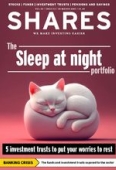Archived article
Please note that tax, investment, pension and ISA rules can change and the information and any views contained in this article may now be inaccurate.
How consumer health leader Haleon is moving on from Zantac troubles and debt headaches

One of the FTSE 100’s newest members, consumer health company Haleon (HLN) was spun out from drugs giant GSK (GSK) and listed on the London and New York stock exchanges in summer 2022.
The demerger, unusual in that it followed a failed £50 billion takeover bid from Unilever (ULVR) for what was then a GSK unit, created the first listed company 100% focused on consumer health and one with heavyweight backing in the form of shareholders GSK and Pfizer (PFE:NYSE).
LITIGATION RISKS MAKE FOR DIFFICULT START
After a difficult start, in part thanks to concerns about its exposure to US litigation alleging links between the Zantac heartburn drug and cancer, Haleon has increasingly found its feet.
Having traded below 250p last autumn the shares are now much closer to their 330p starting point, supported first by the dismissal of thousands of cases by a Florida court in December 2022 and by news Haleon has now settled most Zantac-related personal injury claims pending against the company. Strong operational performance has also helped.
Haleon fans like the exposure to the resilient revenue streams and cash flows generated by a strong portfolio of products spanning headache tablet and toothpaste brands such as Panadol, Sensodyne and Advil. However, this stock market newcomer must prove to investors that price hikes to offset inflationary pressures won’t lead hard-pressed shoppers to turn to cheaper unbranded products.
Brentford-based Haleon’s maiden full year results (2 March) as a standalone entity were encouraging. The £30.4 billion cap delivered healthy 13.8% sales growth to £10.9 billion for the year to December 2022, although pre-tax profits fell 1.1% to £1.62 billion after a rise in finance costs for a company demerged with a significant debt load during an era of rising interest rates.
Haleon paid a full year dividend of 2.4p, which represented roughly 30% of adjusted earnings for the period post-demerger and forecast organic sales growth of 4% to 6% for 2023.
HOW DOES HALEON MAKE MONEY?
Guided by CEO Brian McNamara with respected former Tesco (TSCO) boss Dave Lewis in the chair, Haleon’s stated purpose is ‘to deliver better everyday health with humanity’ through a science-backed brand portfolio which confers pricing power on the business and supports high cash generation.
One of the globe’s largest providers of specialist oral health through trusted products such as Sensodyne, Parodontax and Polident, which help to make peoples’ mouths healthier, Haleon also makes respiratory products to help people breathe more easily, including cold and flu relief Theraflu and nasal decongestant tablet Contac. Its pain relief products include Panadol, Voltaren and Advil and the company also makes vitamins, minerals and supplements such as Centrum and Emergen-C and brands including nicotine replacement therapy Nicorette, heartburn treatment TUMS and ChapStick, America’s favourite lip balm.
Prospective investors are buying into a major player in the £160 billion-plus global consumer healthcare market, one of the fastest growing and resilient segments of the wider consumer staples sector. Haleon looks well-placed to capitalise on a growing global focus on health and wellness coming out of the pandemic as well as the ageing global population, the burgeoning emerging markets middle classes and sizeable unmet consumer needs as public health authorities face increasing pressures.
LONG TRAJECTORY OF GROWTH AHEAD
Haleon has an opportunity for further growth by tapping into trends including premiumisation, where consumers switch to premium alternatives, as well as increasing consumer interest in personalised products and emerging technologies that allow consumers to manage their own health more directly.
And while the US is the largest consumer healthcare market, making up roughly 27% of the total, emerging markets (notably China and India) present attractive opportunities for the company to sell more of its products to billions of consumers.
Haleon is a holding in the James de Uphaugh-managed Edinburgh Investment Trust (EDIN), and as de Uphaugh recently wrote: ‘The international markets that many such firms now operate and trade in, in particular “emerging markets” such as India, offer significant potential for growth.’
He added: ‘Haleon’s brands have science-based claims that are endorsed by health practitioners and backed up by consistent marketing. Its geographic footprint is properly global with strong incumbent positions in the likes of Europe and America but also in India where per capita consumption is a mere pinprick compared to the US. There is a long trajectory of growth ahead.’
Admittedly, Haleon operates in an ultra-competitive market where muscular rivals include Johnson & Johnson (JNJ:NYSE), the healthcare juggernaut planning to spin out its own consumer arm, known for the Tylenol, Listerine and Band-Aid brands, as a new company called Kenvue towards the end of 2023. Haleon also competes with companies such as Reckitt (RKT), Procter & Gamble (PG:NYSE), Sanofi (EPA:SAN) and even Nestle (NESN:SWX), as well as numerous private label players.
But the market is also fragmented and ripe for consolidation by companies such as Haleon with differentiated brands, while management sees significant opportunities to drive greater growth across its product categories by reaching more consumers and fulfilling their unmet needs.
HOW IS HALEON TRADING?
Haleon delivered forecast-beating organic growth of 9% for 2022, up from 3.8% in 2021 and balanced between price increases of 4.3% and robust volume growth of 4.7%, with sales of Panadol, Advil and Theraflu boosted by a prolonged cold and flu season.
Sales surged 40% higher in respiratory health, Haleon’s only category typically driven by seasonal demand, which has been impacted by Covid, but the company also delivered double-digit sales growth in its vitamins, minerals and supplements and pain relief businesses.
As finance director Tobias Hestler, who has identified more than £300 million of cost savings over the next three years, pointed out in the annual report, Haleon is ‘structurally advantaged given that commodity and commodity-related costs make up less than 10% of revenue, meaning that we can be thoughtful about how we price our products. Given inflationary pressures, we took increasing incremental pricing over the course of the year and were able to deliver volume growth and market share gains.’
As for CEO Brain McNamara, he said Haleon’s ‘strong free cash flow generation of £1.6 billion enabled us to de-lever and provides us with increased confidence in reducing debt faster than originally expected.’ Post-demerger, Haleon had net debt of £10.7 billion representing a net debt to adjusted EBITDA ratio of around 4-times, but it finished 2022 with reduced leverage of 3.6-times and expects less than 3-times in 2024.
IS HALEON GOOD VALUE?
Consensus calls for 2023 earnings per share of 18.4p and a 5.8p dividend, rising to 19.9p and 6.6p respectively in 2024.
Based on these estimates, Haleon trades on a price to earnings ratio of 17.9 for this year, falling to a multiple of 16.5 next year’s earnings. This is a higher rating than that commanded by Sanofi and Johnson & Johnson, which trade on 11.1 and 14.4 times forward earnings respectively, it is broadly in line with Reckitt and represents a discount to both Nestle and P&G on 21.6 and 24.7 times forward earnings respectively.
Given Haleon’s enviably strong brand portfolio and attractive end markets, the shares have healthy appeal, particularly as the company’s strong cash flows are enabling it to pay down debt more rapidly than expected.
Important information:
These articles are provided by Shares magazine which is published by AJ Bell Media, a part of AJ Bell. Shares is not written by AJ Bell.
Shares is provided for your general information and use and is not a personal recommendation to invest. It is not intended to be relied upon by you in making or not making any investment decisions. The investments referred to in these articles will not be suitable for all investors. If in doubt please seek appropriate independent financial advice.
Investors acting on the information in these articles do so at their own risk and AJ Bell Media and its staff do not accept liability for losses suffered by investors as a result of their investment decisions.
Issue contents
Feature
Great Ideas
Investment Trusts
News
- UK small cap trusts: upgrade for Mercantile and changes afoot for Abrdn Smaller Companies
- Discover why Wetherspoons shares are up 50% since the start of 2023
- Deliveroo stuck in the mud despite efficiency push
- Why big tech has seen a handsome recovery which may have legs
- Latest retail sales figures show slide in non-essential spending

 magazine
magazine








